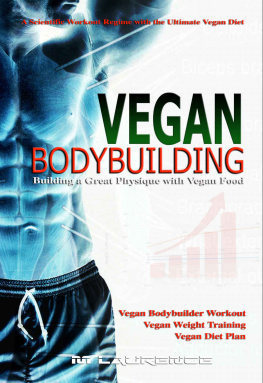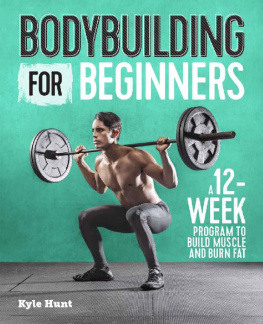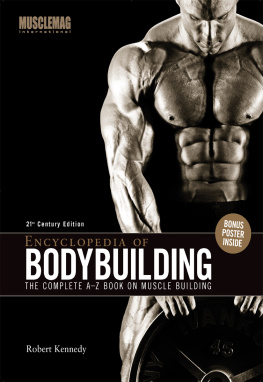APPENDIX
THE COMPETITIVE BODYBUILDING RECORD OF MIKE MENTZER
1. 1970 Mr. PennsylvaniaAAU, 1st (Age 19)
2. 1971 Mr. AmericaAAU, 10th
3. 1971 Teen Mr. AmericaAAU, 2nd
4. 1975 Mr. AmericaIFBB, Medium, 3rd
5. 1975 Mr. USAABBA, Medium, 2nd
6. 1976 Mr. AmericaIFBB, Overall Winner
7. 1976 Mr. AmericaIFBB, Medium, 1st
8. 1976 Mr. UniverseIFBB, Middleweight, 2nd
9. 1977 North American ChampionshipsIFBB, Overall Winner
10. 1977 North American ChampionshipsIFBB, Middleweight, 1st
11. 1977 Mr. UniverseIFBB, Heavyweight, 2nd
12. 1978 Mr. UniverseUSA vs. the WorldIFBB, Heavyweight, 1st (perfect score of 300)
13. 1979 Canada Pro CupIFBB, 2nd
14. 1979 Night of ChampionsIFBB, 3rd
15. 1979 Mr. OlympiaIFBB, HEAVY-WEIGHT, 1st (perfect score of 300)
16. 1979 Pittsburgh Pro InvitationalIFBB, 2nd
17. 1979 Southern Pro CupIFBB, 1st (Also known as the Florida Pro Invitational)
18. 1980 Mr. OlympiaIFBB, 5th
Total Contests Entered: 20
Total Contests Won (First Place Finishes): 8
Total Second Place Finishes: 6
Total Third Place Finishes: 2
Total Fifth Place Finishes: 1
Total Tenth Place Finishes: 1
ABOUT THE AUTHORS
Mike Mentzer (19512001) is the only bodybuilder ever to win the Mr. Universe competition with a perfect score and the man who pioneered and popularized the notion of high-intensity training. He conducted seminars all over the world and was a columnist for Ironman magazine and former editor-in-chief of Muscle and Fitness magazine. He is the author of several bestselling books (Heavy Duty, The Mentzer Method) and is considered one of the greatest bodybuilders in history. To learn more about the teachings of Mike Mentzer, you are encouraged to visit the official Mike Mentzer website, mikementzer.com.
John Little is the author of more than 25 books on bodybuilding, martial arts, history, and philosophy, including Power Factor Training and Static Contraction Training (with Pete Sisco). He is the innovator of the Max Contraction method of bodybuilding/strength training (maxcontraction.com) and was a close friend of Mentzers for more than two decades. Littles books have sold in excess of 600,000 copies and are published in several languages. Little is also an award-winning documentary filmmaker and his articles have been published in every major health and fitness publication in North America.
Chapter 1
THE ROLE OF REALISTIC GOALS
Those readers who have been engaged in serious bodybuilding for more than a year probably have realized that the growth of muscle tissue beyond normal levels is a relatively slow process. And while I have never seen the results of studies that might reveal exactly how many pounds the average bodybuilder gains in the course of one year of hard training, I think that most experienced bodybuilders would agree that a five-pound gain of pure muscle tissueas opposed to five pounds of body weight, despite its compositionwould be considered a considerable achievement.
Five pounds of muscle tissue may not sound very impressive, but if a bodybuilder were able to sustain that rate of growth (5 pounds of pure muscle tissue per year) for five years, he would, at the end of that period, end up some 25 pounds of muscle heavier. If you could envision that much beefsteak laid out in front of you on the dinner table, you would then get some idea as to just how much meat 25 pounds of muscle isenough to transform the average American male weighing 155 pounds into a veritable Hercules at 180 pounds of solid, cut-up muscle. It should also be remembered that of that average American males 155 pounds of body weight, the muscle weight component is roughly 20 pounds (the remainder being bone, water, fat, and waste materials). Given this fact, his muscle weight gain of 25 pounds over five years would represent a transformation that would more than double his existing muscle mass!
Considering that the majority of the top muscle stars past and present weigh less than 200 pounds, that really is quite an achievement. I recall that at the 1977 Mr. Olympia contest bodybuilding luminaries such as Frank Zane weighed in at 187 pounds; Bill Grant at 184 pounds; Boyer Coe tipped the scales at a mere 196 pounds; and Ed Corney competed at a weight of 174 pounds. Barring the odd genetic freak, youd actually be hard-pressed to find more than a handful of top bodybuilding competitors in contest shape that would weigh in excess of 200 pounds.
One of the most massively muscled bodybuilders from that era was Danny Padilla, a man who won the Mr. Universe title in Nimes, France, weighing a very muscular and cut-up 165 pounds. I recall Danny telling me that when he first began training 10 years prior to that contest he weighed a meager 120 pounds. That represents a gain of 45 pounds spanning a 10-year training career, with the yearly average gain being 4 pounds. Those figures may offer hope to those of you disappointed with similar gains.
Bearing this in mind it is now evident just how ludicrous some of those commercial claims in bodybuilding magazines aresuch as those promising a pound a day of muscle gain if you take a particular nutritional supplement. There was even one well-known top bodybuilder who promised those purchasing his training courses that they would gain 100 pounds of muscle if they followed the advice contained in his booklets. It is doubtful that he ever succeeded in gaining that much muscle in his entire careerand yet he was promising everyone else in the world just that.

Mentzer (left) and Casey Viator (right) clowning for the camera; both men possessed a superabundance of the genetic gifts required to become champion bodybuilders.
Of course there will be a number of you reading this book that cannot be counted in the ranks of the average. A few might possess well-above-average potential in gaining muscle mass at a rapid ratea potential that will enable you to add up to 10 or more pounds of muscle tissue in a one-year period. But even these unusual few, whose abundance of the required genetic factors will allow for such rapid growth, wont see the results of such growth every time they step onto a scale. The individual whose potential allows him to gain a solid 12 pounds of muscle a year wont see those results on a day-to-day basis, or even a weekly one; most body weight scales just arent sensitive enough to record fractions of a pound. Only if he were to gain at a steady rate of a pound per month for 12 months might he witness a weight gain once a month. Then there may be a month or two interspersed through the year when he makes no gains at all, but then proceeds to his 12 pound yearly gain by adding 2 pounds of muscle some other month. It is a rare individual indeed who makes such steady gains that theyll show up the same each and every month for a year. The majority will find that they gain in cycles: i.e., three months may pass with no visible signs of improvement, and then the next month their size and strength skyrockets. These growth patterns are highly individual, and thus will vary broadly from person to person.
It will be these few blessed individuals possessing all the required genetic factors who might possibly reach the top and take the big titles. (The next chapter will delve more deeply into the role of genetics in assessing ones ultimate potential.)
I stated at the outset that this book was not intended as a guarantee of a Mr. America physique. Nor would I insult your intelligence and tell you that by following the advice contained in these pages youll end up gaining 50 or 100 pounds of muscle. The material contained in this chapter was not meant to frustrate you either, but to show just how difficult and slow the acquisition of a top physique might be. And if I was successful in doing that, youll probably realize for yourself the utter absurdity of training six days a week for up to 25 hours per week. Can you really justify 1,200 hours per year of your time and energy gaining a couple of pounds of muscle? Especially when you discover how you may have been selling yourself shortvastly underestimating your growth potentialwhen you actually had the capability of gaining 8 pounds of muscle a year from a tiny fraction of the total amount of training. In many cases, the unbridled enthusiasm that leads to training excesses is the very thing that slows down the progress of the majority of bodybuildersfrustrating indeed.











